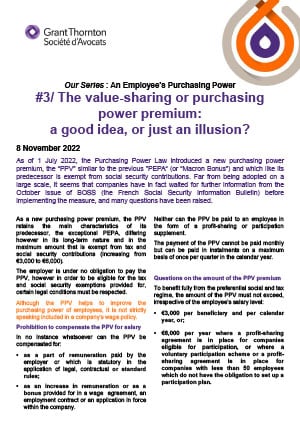-
Tax Policy Management
Tax Policy Management
-
Growth Management
Growth Management
-
Tax audit and litigation
Tax audit and litigation

-
Definition of a strategic and secure transfer pricing structure
Definition of a strategic and secure transfer pricing structure
-
Assistance in the development of international activities and operational reorganisations – “Business restructuring”
Assistance in the development of international activities and operational reorganisations – “Business restructuring”
-
Defense of practices and assistance in the context of tax audits and their follow-up from a litigation viewpoint
Defense of practices and assistance in the context of tax audits and their follow-up from a litigation viewpoint
-
Annual declaration and documentation obligations
Annual declaration and documentation obligations

-
Domestic and international VAT applicable to your company's flow
Domestic and international VAT applicable to your company's flow
-
Banking and financial VAT, VAT in the insurance sector
Banking and financial VAT, VAT in the insurance sector
-
VAT related to real estate registration fees
VAT related to real estate registration fees
-
VAT in the public and non-profit / association sector
VAT in the public and non-profit / association sector
-
Tax audit, tax litigation and relations with the Tax authorities
Tax audit, tax litigation and relations with the Tax authorities
-
Applicable rules for invoicing
Applicable rules for invoicing
-
Customs issues related to your company's international flows
Customs issues related to your company's international flows
-
French VAT registration and compliance obligations
French VAT registration and compliance obligations
-
Payroll tax
Payroll tax
-
Other indirect taxation
Other indirect taxation

-
Company transfer diagnosis
Company transfer diagnosis

-
Distribution strategy : Implementing and structuring
Distribution strategy : Implementing and structuring
-
Distribution activities digitalisation
Distribution activities digitalisation
-
Relations between suppliers and distributors
Relations between suppliers and distributors
-
Contractual policy : etablishing and structuring
Contractual policy : etablishing and structuring
-
Controls and litigation regarding payment terms
Controls and litigation regarding payment terms
-
Organising and securing commercial relations with consumers
Organising and securing commercial relations with consumers
-
Data protection - GDPR
Data protection - GDPR
-
Commercial Leases
Support in the management and contract management of commercial leases.

-
Traditional Services offered
Traditional Services offered
-
Health at work and quality of life at work
Health at work and quality of life at work
-
HR Management Audit
HR Management Audit
-
HR Engineering and People Change
Implementing managerial solutions in line with the company's strategic challenges
-
Management of HR compliance and internal investigations (harassment, discrimination, and whistleblowing)
Management of HR compliance and internal investigations (harassment, discrimination, and whistleblowing)

-
Advice on legal structuring
Advice on legal structuring
-
Day to day company management
Day to day company management
-
Companies reorganisation
Companies reorganisation
-
Mergers & Acquisitions - Private Equity
Mergers & Acquisitions - Private Equity
-
Changes in shareholder structure - Securities issue
Changes in shareholder structure - Securities issue
-
Governance and legal risks management
Governance and legal risks management

-
Development of an international mobility policy
Development of an international mobility policy
-
Coordination of reporting obligations for employees in a mobility situation
Coordination of reporting obligations for employees in a mobility situation
-
Advice on social security
Advice on social security
-
Assistance in labour law
Assistance in labour law

-
Management and protection of your portfolio of property rights
We put the most appropriate protection policy in place for our clients’ intellectual property rights.
-
Securing your projects: advisory and drafting of agreement services
We advise you on the feasibility of your project and the securing of your intellectual property and IT rights.
-
Enforcement of your rights: pre-litigation and litigation
Enforcement of your rights: detection of infringement, pre-litigation and litigation

As of 1 July 2022, the Purchasing Power Law introduced a new purchasing power premium, the “PPV” similar to the previous "PEPA“ (or “Macron Bonus”) and which like its predecessor is exempt from social security contributions. Far from being adopted on a large scale, it seems that companies have in fact waited for further information from the October issue of BOSS (the French Social Security Information Bulletin) before implementing the measure, and many questions have been raised.
As a new purchasing power premium, the PPV retains the main characteristics of its predecessor, the exceptional PEPA, differing however in its long-term nature and in the maximum amount that is exempt from tax and social security contributions (increasing from €3,000 to €6,000).
The employer is under no obligation to pay the PPV, however in order to be eligible for the tax and social security exemptions provided for, certain legal conditions must be respected.
Although the PPV helps to improve the purchasing power of employees, it is not strictly speaking included in a company's wage policy.
Prohibition to compensate the PPV for salary
In no instance whatsoever can the PPV be compensated for:
- as a part of remuneration paid by the employer or which is statutory in the application of legal, contractual or standard rules;
- as an increase in remuneration or as a bonus provided for in a wage agreement, an employment contract or an application in force within the company.
Neither can the PPV be paid to an employee in the form of a profit-sharing or participation supplement.
The payment of the PPV cannot be paid monthly but can be paid in instalments on a maximum basis of once per quarter in the calendar year.
Questions on the amount of the PPV premium
To benefit fully from the preferential social and tax regime, the amount of the PPV must not exceed, irrespective of the employee’s salary level:
- €3,000 per beneficiary and per calendar year, or;
- €6,000 per year where a profit-sharing agreement is in place for companies eligible for participation, or where a voluntary participation scheme or a profit-sharing agreement is in place for companies with less than 50 employees which do not have the obligation to set up a participation plan.
It should be noted however, that the amount of the bonus is freely determined by the employer who can pay a higher or a lower premium amount. The employer can pay the PPV to some employees only and can exclude employees whose remuneration exceeds a certain limit. The same employer can pay different amounts of the premium to different establishments within the company, or even allocate it to certain employees in one or more establishments of their choice.
To read the rest of this alert, please download the PDF below.















